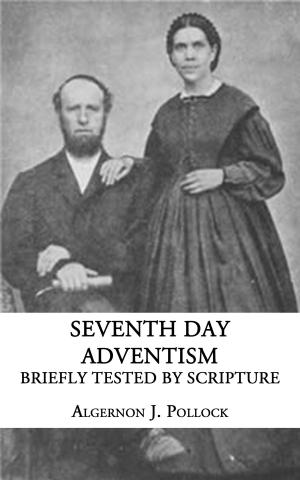| Author: | G. Campbell Morgan | ISBN: | 1230001945157 |
| Publisher: | CrossReach Publications | Publication: | September 30, 2017 |
| Imprint: | Language: | English |
| Author: | G. Campbell Morgan |
| ISBN: | 1230001945157 |
| Publisher: | CrossReach Publications |
| Publication: | September 30, 2017 |
| Imprint: | |
| Language: | English |
WITHIN the phrase the “Ministry of the Word,” there is included the whole conception of the work of preaching as distinguished from that of serving tables. It should at once be recognized that this is a distinction which must be made in practice as well as in theory; but it is equally important that the distinction should be made intelligently, that is with scriptural warrant, rather than on the basis of prejudice or custom. It must be made in the interest of the work of preaching, not in that of the preachers. To say that, is simply to interpret at once the meaning of the Twelve when they took the action which set them apart from their brethren. They were not actuated by any desire to create an order of superiority for themselves, but wholly by a passion for the complete success of the particular work to which they were appointed. The work of serving tables is equally sacred. This is evident from the apostolic description of the character and qualifications of the men who were to be appointed to that work. They were to be men “of good report, full of the Spirit and of wisdom.” The two orders of the ministry were not intended to be conceived of as higher and lower. They were equally important and complementary. The work of each was dependent for complete success upon that of the other. Deacons might also be preachers, as we soon discover in the case of Philip the Evangelist. The probability is that in such a case the work of the Diaconate was given up. The story of Philip would lead us to that conclusion. But even if so, it was not because the work of serving tables was not most sacred, but because no man could perfectly fulfil the work of the service of the Word, while occupied in the doing of the other. All this will be even more clearly seen as we go forward with our study.
Our first business must be that of attempting to get these fundamental conceptions clearly before us, for in proportion as we do so, we shall be the better prepared for the fuller considerations and applications which we propose.
The two conceptions are suggested by the terms “The Ministry,” and “The Word.” The second of these reveals the central and supreme matter; while the first indicates the method by which the work is to be accomplished. We shall devote a Lecture to each. The first, that of the revelation of method suggested by the term “The Ministry,” is our subject now.
In order to an understanding of the fundamental conception suggested by the term The Ministry, we will first examine the place which the term occupies in our paragraph, and then glance on to the development of the thought, as it is found in one outstanding passage in the apostolic writings.
Taking the Revised Version, we find three words which we will note; in verse one, ministration; in verse two, serve; and in verse four, ministry. It will be granted at once that these three words represent the same idea. In the Greek New Testament this is even more apparent, where the words respectively are diakonia, diakonein, and diakonia, the first and the last being identical. The special word of our term then is the word diakonia, translated ministration in verse one, and ministry in verse four. What then, quite apart from any interpretation resulting from our habit and custom in the use of the word, is the first and simplest idea that it suggests?
WITHIN the phrase the “Ministry of the Word,” there is included the whole conception of the work of preaching as distinguished from that of serving tables. It should at once be recognized that this is a distinction which must be made in practice as well as in theory; but it is equally important that the distinction should be made intelligently, that is with scriptural warrant, rather than on the basis of prejudice or custom. It must be made in the interest of the work of preaching, not in that of the preachers. To say that, is simply to interpret at once the meaning of the Twelve when they took the action which set them apart from their brethren. They were not actuated by any desire to create an order of superiority for themselves, but wholly by a passion for the complete success of the particular work to which they were appointed. The work of serving tables is equally sacred. This is evident from the apostolic description of the character and qualifications of the men who were to be appointed to that work. They were to be men “of good report, full of the Spirit and of wisdom.” The two orders of the ministry were not intended to be conceived of as higher and lower. They were equally important and complementary. The work of each was dependent for complete success upon that of the other. Deacons might also be preachers, as we soon discover in the case of Philip the Evangelist. The probability is that in such a case the work of the Diaconate was given up. The story of Philip would lead us to that conclusion. But even if so, it was not because the work of serving tables was not most sacred, but because no man could perfectly fulfil the work of the service of the Word, while occupied in the doing of the other. All this will be even more clearly seen as we go forward with our study.
Our first business must be that of attempting to get these fundamental conceptions clearly before us, for in proportion as we do so, we shall be the better prepared for the fuller considerations and applications which we propose.
The two conceptions are suggested by the terms “The Ministry,” and “The Word.” The second of these reveals the central and supreme matter; while the first indicates the method by which the work is to be accomplished. We shall devote a Lecture to each. The first, that of the revelation of method suggested by the term “The Ministry,” is our subject now.
In order to an understanding of the fundamental conception suggested by the term The Ministry, we will first examine the place which the term occupies in our paragraph, and then glance on to the development of the thought, as it is found in one outstanding passage in the apostolic writings.
Taking the Revised Version, we find three words which we will note; in verse one, ministration; in verse two, serve; and in verse four, ministry. It will be granted at once that these three words represent the same idea. In the Greek New Testament this is even more apparent, where the words respectively are diakonia, diakonein, and diakonia, the first and the last being identical. The special word of our term then is the word diakonia, translated ministration in verse one, and ministry in verse four. What then, quite apart from any interpretation resulting from our habit and custom in the use of the word, is the first and simplest idea that it suggests?















